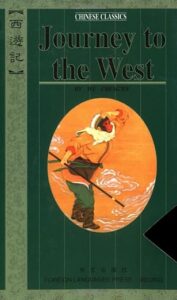Each month, we ask a member of faculty to tell us about one book that played an outsized role in making them who they are today. This month, Professor of Humanities Simon Kow delves into a lifelong favourite as his Words to Live By.
What book have you chosen?

I have chosen the classic sixteenth-century Chinese novel, Journey to the West, traditionally attributed to a minor scholar and poet during the late Ming dynasty named Wu Cheng’en. Two of the most popular abridgements of this very long novel are entitled Monkey: Folk Novel of China and Monkey King: Journey to the West, given that the main character of this folk novel is a mischievous and powerful Monkey King.
When did you first read this book?
Interestingly, I don’t actually remember the first time I read a version of the book. This is due to the fact that the story of the Monkey King is so much part of Chinese and east Asian folk mythology that people of Chinese and East Asian background “know” the story long before they read the novel—if they ever end up reading the book at all! Many children hear these stories from their parents. My first memories of the story of the Monkey King with a gold-hooped staff to fight monsters and able to somersault to the clouds stem from a very low-budget Japanese TV version of the story which played on television in Britain in my early childhood. Like many children, I sought to imitate Monkey when not pretending to be Superman, Batman or a Dalek.
Was it a book that you read quickly or did you take your time reading it?
I am certain that I read it quickly, as I always read it quickly whenever I pick it up. Much of the novel is written for sheer entertainment, a combination of magical fantasy, kung fu action, satire and vulgar comedy.
What was it about the book that first stood out to you?
As a child, I was—in my mother’s words—”full of imagination,” and so I could not get enough of the characters, story and vast invention of the book: this is true of many generations of people in East Asia or of East Asian background. Monkey reminded me, as it has reminded so many children and adults, of themselves: restless, mischievous, unruly, needing discipline but continually pushing against boundaries and transgressing rules.
Have you reread this book? If so, did you get something different from it on rereading?

Until my early adulthood, I tended to treat it as a fun fantasy novel whose main purpose is entertainment (which is largely true). As a graduate student at the University of Toronto, I had the opportunity to act as a teaching assistant for my doctoral supervisor, Ed Andrew, who assigned Monkey in his politics and literature class alongside Aeschylus’s Eumenides and Shakespeare’s Hamlet. This was a revelation to me: that amidst the silliness and rollicking fun was also a story of Buddhist self-discipline, taming the Monkey as it were. Over the years, I have integrated it into some of my teaching at King’s, including a lecture in FYP, as well as Halifax Humanities 101. Having read various abridgements over the years, I never had the opportunity, resources or courage to tackle the entire 100-chapter novel until this past summer. Much to my delight, though the full-length version contains a vast wealth of details and even metaphysical Buddhist poetry, it is just as fun and irreverent as the abridgements.
How did this book shape you?
As a child and teenager, the story of the Monkey King was a fun way for me to inhabit an important and fun part of my Chinese heritage. As an EMSP professor and for my students, it has proven itself time and again to be an enjoyable and playful lens to think about Chinese culture—including the syncretism of Buddhism, Daoism and Confucianism of Ming China—in the early modern period. Lecturing on it in FYP since 2022 has been to me instructive of the challenges facing FYP amidst calls for greater diversity: to what extent can a traditionally Western-focused Great Books program successfully integrate what is unquestionably one of the Great Books of non-Western literature?
What do you think it is about this book that made such an impact?
The main characters of Journey to the West represent different sides of the human character, and I can personally identify with each one of them: the mischievous, restless Monkey; the fallible human master Tripitaka who gives up too easily and is too slavish when it comes to the rules; the swinish appetites of the hoglike Pigsy; and the melancholy of the bitter pilgrim Sandy. The story translates so well across cultures while being distinctively Chinese (but also Indian-influenced in its Buddhist aspects) that it continues to teach me, and I hope others, about how important it is to open one’s mind to new possibilities outside of one’s own traditions—and not to take oneself or one’s traditions too seriously either.
Who do you think should read this book?
Anyone who is open-minded with a healthy sense of humour!

